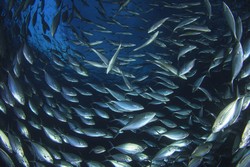Fish stock assessment advanced
To assess stocks and fisheries' dynamics and develop effective management measures, integrated stock assessment techniques are needed. The EU funded the AMFISALS (Advanced models for fisheries stock assessment of large pelagics) initiative to provide training for a fellow in state-of-the-art stock assessment models. The AMFISALS fellow received exhaustive training in multiple areas to ensure the requisite expertise for assessing the stock status of migratory fish species. Topics covered include database management, training in relevant software such as Tagdagger, Mufdagger, R programming and the stock assessment software MULTIFAN-CL. Previous stock assessment work had ignored the dynamics of tuna in the Eastern Pacific area and recent tagging data revealed substantial movement of bigeye tuna between the central and eastern Pacific Ocean. A key achievement, the AMFISALS fellow participated in a Pacific-wide assessment of bigeye tuna to re-evaluate their spatial domain in the existing models. The researcher contributed considerably in the tasks involved in stock assessment in terms of correction of tag release and purse seine size data. Furthermore, the existing models were updated through the use of different sensitivity scenarios. Results were presented at the 11th Regular Session of the Scientific Committee of the Western and Central Pacific Fisheries Commission. The AMFISALS fellow also contributed significantly in the area of electronic tagging, leading to two publications on pop-up satellite tagging of swordfish and bluefin tuna. Already, in an ongoing international collaboration, the researcher has determined factors leading to overfishing of bigeye tuna. A major factor was found to be the bycatch of bigeye juveniles in purse seine sets on fish aggregating devices. This has significant implications when developing bycatch mitigation measures. The research fellow is also engaged in other research collaborations on fish stock assessment, bycatch mitigation and determination of environmental impact on fish production. AMFISALS activities have ensured the availability of skilled expertise in the dynamic and complex area of global fish stock management and assessment. Besides facilitating research in sustainability sciences, the EU now have a technical advisor to aid in fisheries management and guide policy making.







